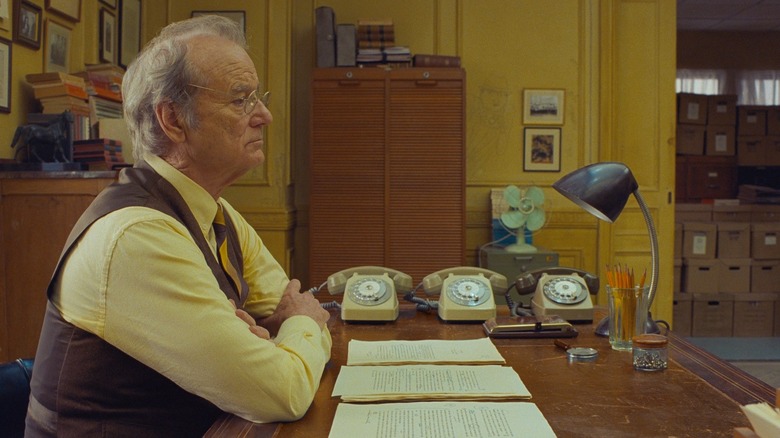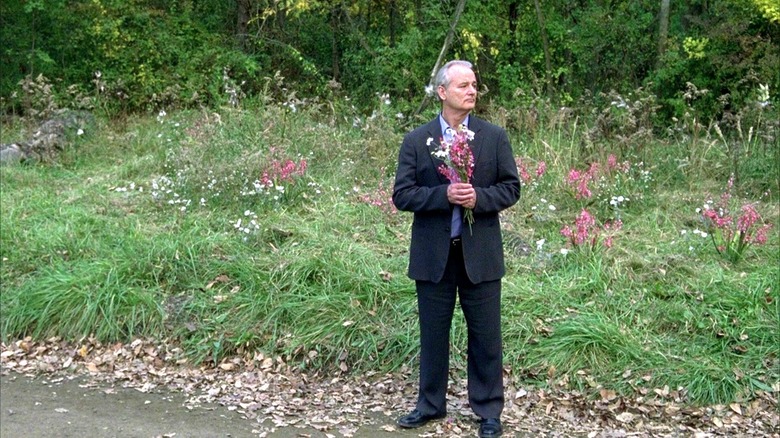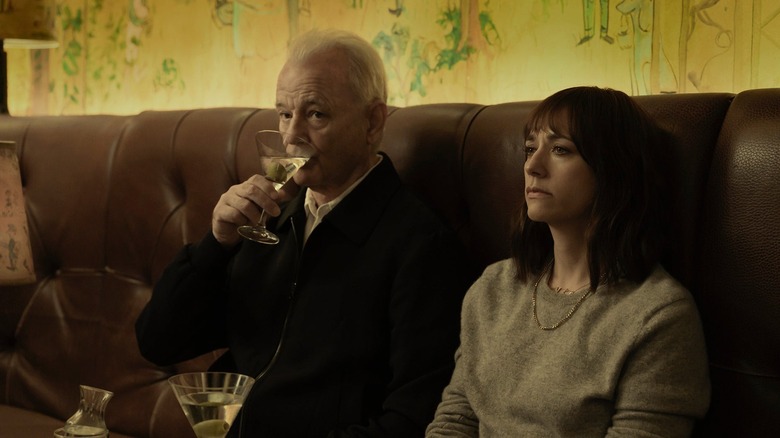Bill Murray Doesn't Think Bill Murray Has Much To Do With His Success
Bill Murray began his career in comedy with Chicago's improv comedy troupe The Second City. He also became involved with National Lampoon after being recruited by John Belushi. In 1977, he joined the cast of the then-still-kinda-new "Saturday Night Live," bringing him into the public eye. In 1979, he was cast in Harold Ramis' summer camp comedy "Meatballs," and would go on to star in several high-profile comedies like "Stripes," "Caddyshack," and Best Picture nominee "Tootsie." In 1984, Murray landed his first cinematic leading roles, in John Byrum's adaptation of "The Razor's Edge," which Murray co-wrote, and Ivan Reitman's supernatural comedy "Ghostbusters."
Prior to the release of Wes Anderson's "The French Dispatch" in 2021, Murray looked back at the current state of his career, where he finds himself having worked with several notable indie directors multiple times apiece. Murray has made nine films with Anderson, several films with Sofia Coppola, and regularly appears in the work of Jim Jarmusch. "I feel like that's the reward I got for not being too terrible early on," he said. The secret to Murray's success, it seems, was to start strong. Also, to not make garbage. "I always say to people: 'Well if you don't really embarrass yourself and do a piece of real garbage, you're gonna have legitimacy."
As for his collaborations with Anderson, Coppola, and Jarmusch, Murray says "They've sort of validated my career in a way, the fact that these great directors keep calling me up every once in a while."
The Bill Murray 1-800 number
When doing press for Jarmusch's 2019 zombie comedy "The Dead Don't Die," Murray revealed a system that he had developed in order to be choosier about the roles he takes: A 1-800 number. After being harangued by Hollywood agents and filmmakers at his home for too many years, Murray needed a buffer to make sure he could filter out the delude of half-hearted offers he was constantly receiving. He understood that Hollywood agents were constantly tasked with getting him on the phone, and they were too successful too often. Murray created his 1-800 number and an answering machine to hear from only a few people that he wanted to hear from.
The legend goes that Murray checks his voicemail whenever he wants, and if he happens to hear from someone he recognizes, and they have a project that he's interested in, he'll take it:
"Because these three people call me up, I worry even less than ever before that someone's gonna call me up. I don't have to go looking for work, anyway. I mean if you did nine movies with Wes Anderson ... people will call that a career."
The people who know can reach him, but "The people that don't know me just have a little more difficulty."
In short, Bill Murray feels like his recent success is more reliant on being a part of interesting filmmakers' projects, and less reliant on continued career-building. Although it certainly helps that Murray is excellent in the roles he takes.
The t-shirt version of Murray
Murray's integrity can be admired. While some of his films from the 1980s have enormous groups of fans, Murray doesn't seem to have caved into pressure or obligation to continued sequels, follow-ups, or remakes. He did not appear in "Caddyshack II," and often decried his appearance in "Ghostbusters II," despite instant insistence that it be made:
"So much of the momentum was about making the money. I went five years before we made the second one. Five years! And they were pushing for it the hour after the first one came out."
"I probably won't 'Ghostbusters II'" he said on "Saturday Night Live," then later said he was hoodwinked into appearing in the film. His interest in the film's remake was more because he admired the talented comics behind it. He said:
"I did that because I like those girls. I don't mean to sound important, but that was a case of saying, 'Okay, these girls are funny. They deserve a shot to make this thing and why shouldn't girls get to be Ghostbusters?'"
In recent years, Murray, now 71, has something of a cult around him. Thanks to his 1-800 number, he seems to have developed a more laid-back attitude toward his career, and that lackadaisical vibe has carried over into a mythic version of Murray found on t-shirts. He was once an on-screen troublemaker, became a comedic leading man, and is now the cool grandfather to a generation of young fans. Murray would be within his rights to occasionally be immodest and take credit for his own success. After all, he couldn't have done it without him.


